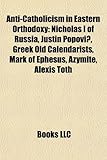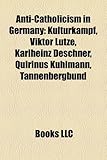Anti-Catholicism in Eastern Orthodoxy: Nicholas I of Russia, Justin Popovic, Greek Old Calendarists, Mark of Ephesus, Azymite, Alexis Toth
Anti-Catholicism in Eastern Orthodoxy: Nicholas I of Russia, Justin Popovic, Greek Old Calendarists, Mark of Ephesus, Azymite, Alexis Toth

Purchase includes a free trial membership in the publisher's book club where you can select from more than a million books without charge. Chapters: Nicholas I of Russia, Justin Popović, Greek Old Calendarists, Mark of Ephesus, Azymite, Alexis Toth, Diomid Dzyuban, Patriarch Job of Moscow, Azymes. Source: Wikipedia. Free updates online. Not illustrated. Excerpt: Nicholas I (Russian: , Nikolaj I Pavlovi), (6 July 1796 2 March 1855), was the Emperor of Russia from 1825 until 1855, known as one of the most reactionary of the Russian monarchs. On the eve of his death, the Russian Empire reached its historical zenith spanning over 20 million square kilometers. In his capacity as the emperor he was also the King of Poland and the Grand Duke of Finland. Nicholas I was born in Gatchina to Emperor Paul I and Empress Maria Feodorovna. He was a younger brother to Alexander I of Russia and Grand Duke Constantine Pavlovich of Russia. Nicholas was not brought up to be the Emperor of Russia; he had two elder brothers before him. As such, in 1825, when Alexander I suddenly died of typhus, Nicholas was caught between swearing allegiance to his second-eldest brother Constantine Pavlovich and accepting the throne for himself. The interregnum lasted until Constantine Pavlovich, who was in Warsaw at that time, confirmed his refusal. Additionally, on 25 December (13 Old Style) Nicholas issued the manifesto claiming his accession to the throne. That manifesto retroactively named 1 December (19 November Old Style), the date of Alexander I's death, as the beginning of his reign. During this confusion a plot was hatched by the military to overthrow Nicholas and to usurp power. This led to the Decembrist Revolt on 26 December (14 Old Style) 1825, an uprising Nicholas was successful in suppressing. Nicholas completely lacked his brothers' spiritual and intellectual breadth; he saw his role simply as one paternal autocrat ruling his people by whatever mea...More: http://booksllc.net/?id=46641

List Price: $ 14.14
Price: $ 14.13
Anti-Catholicism in Germany: Kulturkampf, Karlheinz Deschner, Viktor Lutze, Quirinus Kuhlmann, Tannenbergbund, Georg Witzel

Chapters: Kulturkampf, Karlheinz Deschner, Viktor Lutze, Quirinus Kuhlmann, Tannenbergbund, Georg Witzel. Source: Wikipedia. Pages: 33. Not illustrated. Free updates online. Purchase includes a free trial membership in the publisher's book club where you can select from more than a million books without charge. Excerpt: Viktor Lutze (December 28, 1890-May 2, 1943) was the commander of the SA succeeding Ernst Röhm as Stabschef. Lutze was born in Bevergern, Westphalia, the son of a peasant craftsman. After a short career in the post office, he joined the German Army in 1912, serving with the 55th Infantry Regiment. He fought in the 369th Infantry Regiment and 15th Reserve Infantry Regiment during World War I. He became a company commander and was heavily wounded four times, including loss of his left eye. After the war, Lutze became a merchant and joined the police force. He joined the National Socialist German Workers Party (Nazi Party) in 1922, and the Prussian State Council. He became an associate of Franz Pfeffer von Salomon, the first leader of the SA. Together, they determined the structure of the organization. He also worked with Albert Leo Schlageter in the resistance/sabotage of the Belgian and French occupation of the Ruhr in 1923. His organization of the Ruhr for the SA became a model for other regions after 1926. With the assumption of power by the NSDAP in March 1933, he was appointed police president of Hanover and later provincial governor and state counselor. Lutze's participation in the Night of the Long Knives in 1934 was very important, as it was he who informed Adolf Hitler about Ernst Röhm's anti-regime activities. (Hitler at first said "We'll have to let the thing ripen"). In preparation for the purge, both Heinrich Himmler and his deputy Reinhard Heydrich, chief of the SS Security Service (SD), assembled dossiers of manufactured evidence to suggest that Röhm was going to overthrow Hitler. Meanwhile Görin...More: http://booksllc.net/?id=262871

List Price: $ 14.14
Price: $ 14.14
No comments:
Post a Comment